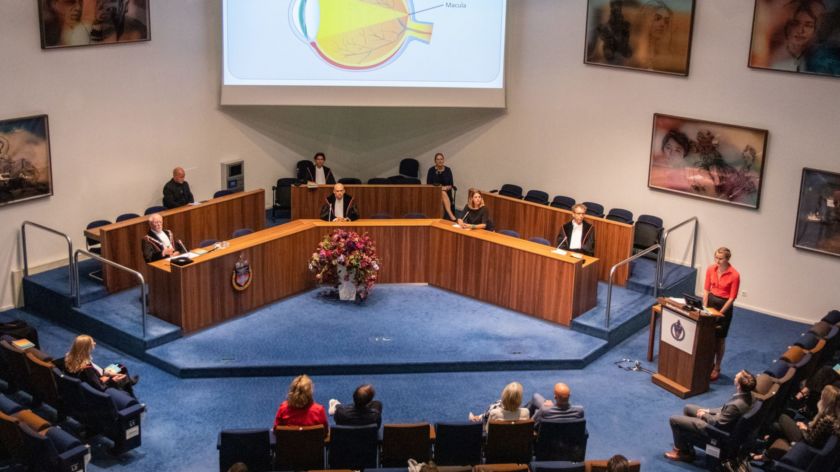New PhD candidate rules to improve quality doctoral programmes
-
 © Rein Wieringa
© Rein Wieringa
There are brand new doctorate regulations, starting this month. Additionally, PhD candidates will have to sign up for the PhD tracking system Hora Finita. Here are five questions regarding the new regulations.
#1 Doctorate regu-what?
The doctorate regulations are basically a list of rules and agreements for everyone involved in a PhD thesis. This includes not just the candidates themselves, but also their supervisors. Among other things, the regulations state that candidates will have to set up a schedule for the courses they want to take, and what procedure needs to be followed when the thesis has been completed.
#2 Why do we even need these regulations anyway? It’s not like there are teacher regulations…
PhD candidates have a special place in the university. If someone writes a PhD thesis, they are essentially demonstrating that they are well qualified for doing scientific research. The PhD programme is considered to more of a training programme than other jobs in academia, like postdoc or (substitute) lecturer. The doctorate regulations are an important tool for universities to uphold the quality of the programme.
Not only that, PhD candidates are also in a vulnerable position on the bottom rung of the academic ladder. The past few years a lot of stories have come out about candidates who experienced heavy workloads or abuses of power, as well as other kinds of abuse. The new regulations are meant to offer protection from this sort of thing.
#3 Why were the rules changed?
Policy officer Steffie Hampsink explains that there are several different reasons for this. ‘First of all, the old document aligned with neither current scientific practices nor the arrangements made within university association VSNU.’ Like other PhD candidate interest groups, the VNSU has been keen on following PhD programmes’ progress for a while now. Quote Hampsink: ‘The old version of the regulations in Nijmegen only described the procedure that needed to be followed once someone finished their thesis. This included things like assembling a manuscript committee and setting a date for doctoral defence ceremony.’ Arrangements concerning the programme supervision and the implementation of the training part were much more open.
A ‘four-eyes principle’ is meant to prevent candidates from becoming too dependent on their supervisor.
Hampsink goes on to say that there were no black-and-white rules regarding how PhD candidates were to handle their research data, and how this data was supposed to be archived. Lastly, there was little oversight on the programmes of so-called external PhD candidates: people who are working on a PhD thesis but are not employed by the university.
#4 What are the tangible changes?
There are three changes that jump out. The most important change is that every candidate will have at least two supervisors going forward. This ‘four-eyes principle’ is meant to prevent candidates from becoming too dependent on their supervisor. The graduate school’s coordinator will also be keeping an eye on things through annual meetings. ‘That makes it easier to blow the whistle,’ according to Hampsink.
Secondly, it will be mandatory for candidates to register at the graduate school. They will also be required to set up a so-called Training and Supervision Plan (TSP; Dutch: opleidings- en begeleidingsplan, OBP). Among other things, this plan will include the professional development courses a candidate will take – courses on presentation skills or statistics, for example. The exact contents of the TSP will vary per graduate school and per type of candidate – either regular or external.
Every candidate is required to register for the PhD tracking system Hora Finita.
Finally, every candidate is required to register for the new PhD tracking system Hora Finita at the start of their PhD programme. ‘It contains a dashboard with an overview -for both candidate and supervisor- of all the tasks and checklists,’ says Bea Edlinger, who helped to set up the system in Nijmegen. For example, diplomas and the TSP need to be uploaded; the system also shows when people are scheduled to have progress evaluation meetings.
PhD programmes generally take a year longer than the normally proscribed four years. Only 6.5 percent of candidates completes their PhD thesis within that four-year term; 43 percent are still not finished after six years. Despite this, boosting these ratios is not a primary goal of the new regulations, according to Hampsink.
#5 To whom will these regulations apply?
They will apply to all PhD candidates. Whether they have a four-year employment at Radboud University; they are being financed through an external scholarship; or they are an external PhD candidate. ‘If you are not registered in the tracking system, you will not be allowed to finish your PhD programme,’ according to Hampsink. Even those candidates who are already a year into their programme will transition to the new system. There will be a transitional arrangement for those who have already finished their thesis. Many other universities have also recently adapted their doctorate regulations.



